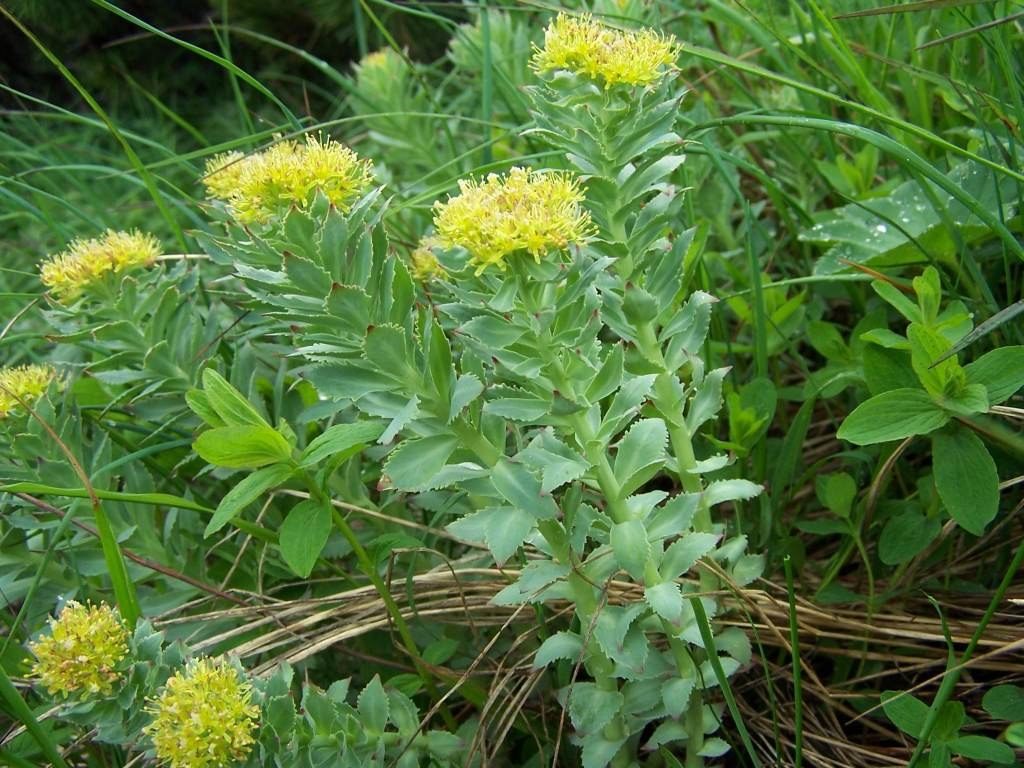 Roseroot (Rhodiola rosea) is a perennials flowering plant that has useful medicinal properties in humans. The plant grown natively in a large part of Europe, Asia and North America. Roseroot grows to about 50 cm in height and has yellow flowers. The plant is also known by a number of other names including orpin rose, arctic root and golden root. Medicinally roseroot is known to be an adaptogenic herb, and in this regard has a similar use to ginseng. The benefits of roseroot extract may include a non-specific resistance to the damage from stress. As stress may be a cause of depression, the adaptogenic properties of roseroot against stress may explain some of its potential benefits against depressive symptoms. For example, the effects of extracts of roseroot have been investigated conjunction with tricyclic antidepressants in patients with depressive symptoms. The addition of roseroot decreased the side effects of the drugs, and also decreased the negative psychiatric and physiological symptoms of the individuals.
Roseroot (Rhodiola rosea) is a perennials flowering plant that has useful medicinal properties in humans. The plant grown natively in a large part of Europe, Asia and North America. Roseroot grows to about 50 cm in height and has yellow flowers. The plant is also known by a number of other names including orpin rose, arctic root and golden root. Medicinally roseroot is known to be an adaptogenic herb, and in this regard has a similar use to ginseng. The benefits of roseroot extract may include a non-specific resistance to the damage from stress. As stress may be a cause of depression, the adaptogenic properties of roseroot against stress may explain some of its potential benefits against depressive symptoms. For example, the effects of extracts of roseroot have been investigated conjunction with tricyclic antidepressants in patients with depressive symptoms. The addition of roseroot decreased the side effects of the drugs, and also decreased the negative psychiatric and physiological symptoms of the individuals.

Roseroot (Rhodiola rosea) may also have beneficial effects in the treatment of anxiety. For example, in one study, researcher investigated the effects of a roseroot extract on the symptoms of patients with generalised anxiety disorder (GAD). Subjects received 340 mg per day of roseroot extract for 10 weeks. After this time there was a significant reduction in the anxiety symptoms experienced by the patients, as described by the Hamilton Anxiety Rating Scale. Therefore roseroot may be a useful treatment for mild to moderate anxiety in human subjects. Image (roseroot (Rhodiola rosea): By Opioła Jerzy (Own work) [GFDL (http://www.gnu.org/ copyleft/fdl.html), CC-BY-SA-3.0 (http://creativecommons.org/ licenses/by-sa/3.0/) or CC BY 2.5 (http://creativecommons.org/licenses/by/2.5)], via Wikimedia Commons.
Human studies investigating the antidepressant effects of roseroot as a single therapy to treat depression are quite limited. However, one study has investigated the antidepressant effects of roseroot in depressed human subjects with low self esteem. Patients with mild to moderate depression were administered either 340 mg per day of roseroot, 680 mg per day roseroot or a placebo. The roseroot extract was a standardised extract of roseroot rhizome called SHR-5. Following 42 days of the study, those subjects taking the roseroot had significant reductions in overall depression, insomnia, emotional instability and the physiological symptoms of depression, compared to the placebo treatment. While the self esteem of the subjects did improve, there was no difference between the roseroot and the placebo groups. There were no serious side effects detected in any of the patients taking the roseroot. The authors concluded that roseroot may be a useful treatment for individuals with mild to moderate depression.
Eat Well, Stay Healthy, Protect Yourself
RdB
